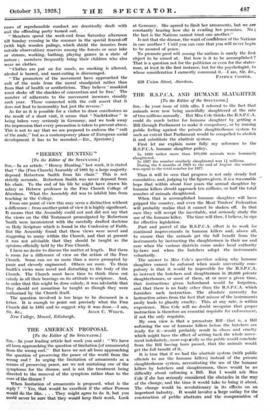THE R.S.P.C.A. AND HUMANE SLAUGHTER
[To the Editor of the SPECTATOR.]
Sui,—In your issue of 15th ulto. I referred to the fact that animals were now being mercifully slaughtered at the rate of two millions annually. But Miss Cole thinks the R.S.P.C.A.
could do much better for humane slaughter by getting a Bill through Parliament to make it compulsory, or by rousing public feeling against the private slaughterhouse system to such an extent that Parliament would be compelled to abolish it and substitute the abattoir system.
First let me explain more fully my reference to the R.S.P.CA. humane slaughter policy.
In 1920 rather more than 100,000 animals were humanely slaughtered.
In 1927 the number similarly slaughtered was 11 millions. During the 8 months of 1928 to the end of August the number was equal to the total number for 1927.
Thus it will be seen that progress is not only steady but cumulative, and, judging by the figures given, it is a reasonable hope that within about four years the annual slaughter by humane killers should approach ten millions, or half the total number of animals slaughtered.
When that is accomplished humane slaughter will have gripped the country, and even the Meat Traders' Federation will probably realize that it cannot be shaken off. In that case they will accept the inevitable, and seriously study the use of the humane killer. The time will then, I believe, be ripe for effective legislation.
Part and parcel of the R.S.P.C.A. effort is to work for continual improvements in humane killers and, above all, to ensure that the animals get the full benefit from the instruments by instructing the slaughtermen in their use and care when the various districts come under local authority by-laws and when the butchers adopt the instruments voluntarily.
The answer to Miss Cole's question asking why humane slaughter cannot be enforced when made universally com- pulsory is that it would be impossible for the R.S.P.C.A. to instruct the butchers and slaughtermen in 20,000 private slaughterhouses, or most of them, at or near a given time, that instructions given beforehand would be forgotten, and that there is no body other than the R.S.P.C.A. which furnishes such instruction. The absolute necessity for instruction arises from the fact that misuse of the instruments easily leads to ghastly cruelty. This, at any rate, is within experience. Miss Cole will no doubt recognize that proper instruction is therefore an essential requisite for enforcement, if not the only requisite.
My own view is that a premature Bill—that is, a Bill enforcing the use of humane killers before the butchers are ready for it—would probably result in chaos and cruelty which might have the effect of setting back the whole move- ment indefinitely, more espceally as the public would conclude from the Bill having been passed, that the animals would get the full benefit of it. It is true that if we had the abattoir system (with public
officials to use the humane killers) instead of the private slaughterhouse system, necessitating the use of the humane killers by butchers and slaughtermen, there would be no difficulty about enforcing a Bill. But I would ask Miss Cole if she has seriously considered the obstacles in the way of the change, and the time it would take to bring it about. The change would be revolutionary in its effects on an important industry. It would involve a large outlay for the construction of public abattoirs and the compensation of
occupiers of private slaughterhouses.. Is there the least chance of stirring up enthusiasm for such a scheme or that any Government would take it up until such time in the future as our War Debts and our taxes have been reduced far below their present levels ?
In all matters concerning cruelty to animals the guiding star for the course to be adopted must be the interests of the animals themselves, even when it appears to conflict with the views and desires of many animal sympathizers. The conditions in Scotland favoured Parliamentary legislation for humane slaughter, and because such legislation in that country was in the interests of the animals themselves, the R.S.P.C.A. did their utmost to .assist in getting through the Scottish Bill. Let me say here that the great champions of humane slaughter in Scotland—the men who did more than anyone else towards promoting it in that country—are ex-Bailie Brechin, of Glasgow, and Mr. John Robertson, of Edinburgh.
I should add that whatever opinions about humane slaughter which I have expressed in this letter are my own and do not commit the R.S.P.C.A.—I am, Sir, &c.,









































 Previous page
Previous page